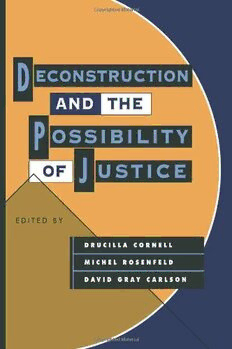
Deconstruction and the Possibility of Justice PDF
210 Pages·1992·64.073 MB·English
Most books are stored in the elastic cloud where traffic is expensive. For this reason, we have a limit on daily download.
Preview Deconstruction and the Possibility of Justice
Description:
To many, the very title of this book, Deconstruction and the Possibility of Justice, would seem to be an oxymoron. At least by its critics, deconstruction has been associated with cynicism toward the very idea of justice. Justice, so the story goes, demands reconstruction, not deconstruction. Yet even its critics recognize that deconstruction is, in some way, aligned with the marginalized. Within literary studies we hear the same cry: deconstruction has brought in its wake the clamor for the recognition of many voices outside the traditional canon. While bringing the margin to the center is undoubtedly a result of deconstruction in political philosophy and literary criticism, deconstruction faces, and acknowledges that it faces a philosophical challenge of its own. What should be' demands an appeal to some criteria of justice. Jacques Derrida's more liberal critics have focused on just this problem. They have insisted that even if one can appreciate deconstruction's alliance with the underdog, deconstruction cannot provide an ethical basis for this alliance, let alone argue the necessity of such an alliance. The purpose of this volume is to rethink the questions posed by Derrida's writings and his unique philosophical positioning, without reference to the catch phrases that have supposedly captured deconstruction in a nutshell.
See more
The list of books you might like
Most books are stored in the elastic cloud where traffic is expensive. For this reason, we have a limit on daily download.
